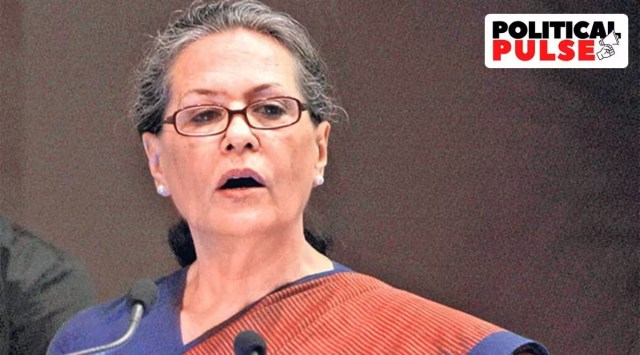Sonia Gandhi writes to PM on special session, flags Manipur, Adani, caste census for discussion
BJP accuses her of “politicising” functioning of Parliament, says parties never consulted in advance on session
 Sonia Gandhi's letter came a day after the party’s top leadership and the floor leaders of INDIA met separately to decide the strategy for the five-day session beginning September 18. (Express file)
Sonia Gandhi's letter came a day after the party’s top leadership and the floor leaders of INDIA met separately to decide the strategy for the five-day session beginning September 18. (Express file)
CONGRESS Parliamentary Party chairperson Sonia Gandhi wrote to Prime Minister Narendra Modi on Wednesday over the Parliament special session called on September 18, flagging nine issues which her party wanted discussed in the House, including the Chinese incursion in Ladakh, Manipur violence, price rise and the allegations against the Adani Group.
The decision that she would send the letter had been taken at a meeting of floor leaders of the INDIA alliance on Tuesday, which was called to work out the strategy for the five-day session beginning on September 18.
The government has not spelled out the agenda for the special session, even as it has said that there will be no question hour, zero hour or private members’ business during the session.
In her letter, Sonia wrote: “I must point out that this special session has been convened without any consultation with other political parties. None of us have any idea of its agenda. All we have been communicated is that all five days have been allocated for government business.”
 Sonia Gandhi’s letter to the Prime Minister
Sonia Gandhi’s letter to the Prime Minister
Soon after the letter became public, Parliamentary Affairs Minister Pralhad Joshi hit back. “It is very unfortunate that you are trying to politicise the functioning of Parliament, our temple of democracy, and create unnecessary controversy,” Joshi said to Sonia’s letter, adding that the special session had been convened after following all established procedures and that political parties were never consulted in advance on this.
Joshi also said that the issues listed by Sonia for discussion in the special session had already been raised and replied to by the government during the debate on the no-trust motion in the Monsoon Session.
The issues flagged by Sonia include the economic situation in the country, with a focus on price rise, unemployment, rise in inequalities, and distress of micro, small and medium enterprises; farmers’ issues; the demand for a JPC to investigate the transactions of the Adani business group in the light of new revelations; the situation in Manipur; the rise in communal tension in different states like Haryana; the continuing border tension with China; the holding of a caste census; the “damage” to federal structure; and the impact of floods and drought in many states.
While the Opposition has questioned the government over not specifying the agenda for the special session, it has decided against boycotting it. The majority view at the Opposition meeting on Tuesday was that parties should seek to raise issues of common concern and even a walkout should be symbolic. In other words, the MPs could stage a walkout in protest, but return to the House.
Incidentally, this follows the accusations by the government against the Opposition of “running away” from discussions in Parliament, citing the frequent House disruptions during the Winter Session and its walkout before the voting on the no-trust motion.
In her letter, Sonia wrote: “We most certainly want to participate in the special session because it will give us an opportunity to raise matters of public concern and importance… I earnestly hope that in the spirit of constructive cooperation, these issues will be taken up in the forthcoming special session.”
Union minister Piyush Goyal accused Sonia, the Congress and the Opposition of “trying to politicise the special session”. “I request Sonia Gandhi and her party to take part in the special session… The Congress does not have issues…They only give statements to divide the nation,” Goyal said.
The issues listed by the former Congress president have been frequently raised by the party, with the demand for a JPC group to probe the charges against the Adani Group stalling the Budget Session of Parliament, and the Opposition’s demand for PM Modi’s statement on Manipur disrupting the Monsoon Session.
Apart from the demand for a caste census, the other issues are common to most of the INDIA parties.
At the meeting of the INDIA alliance in Mumbai some days ago, many of the parties – especially from the Hindi heartland – had argued that the demand for holding a caste census should be raised during the special session to put the government on the mat, drawing it into forward versus backward politics.
The Trinamool Congress, however, had sought some time to formulate its view on the issue.
The BJP has tried to dodge the issue of caste census. While its state unit in Bihar earlier lent its support to a unanimous resolution moved by the state Assembly on caste census, in a short affidavit filed in the Supreme Court recently over a petition against the Bihar government move, the Modi government said only the Central government was empowered to conduct a census.
The Bihar government’s defence is that it is holding a caste “survey” and not a “census”.





- 01
- 02
- 03
- 04
- 05


























